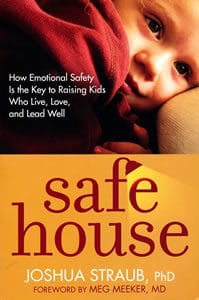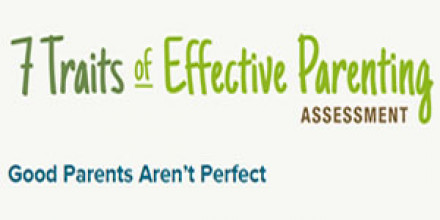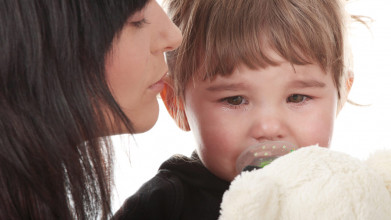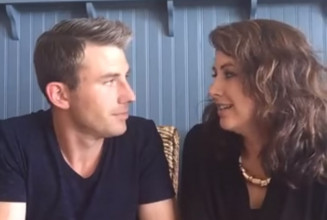Opening :
Teaser:
Mrs. Christi Straub: Well, I knew in that moment that, if she saw fear in my face or worry, that I was concerned about her or us leaving her, that she would interpret [that as], there is something to fear here.
End of Teaser
John Fuller: That’s Christi Straub, explaining the importance of emotional safety in your family and she’s back with us today, along with her husband, Dr. Joshua Straub and they’re gonna talk about that in depth and your host is Focus president and author, Jim Daly. I’m John Fuller.
Jim Daly: John, I’m tellin’ ya, this topic of emotional safety is not something we often think about. As we started last time, we think about physical safety, right? Go down.
John: Lock the doors.
Jim: Lock ’em.
John: Check the other stuff, yeah.
Jim: But we don’t as parents, pay enough attention to creating a safe house, a house where emotionally your kids are being raised in a healthy way.
Not that you have to be perfect. In fact, last time we ended on the fact that two out of five times, you gotta hit the mark two out of five times. That’s a fairly low bar. That means you can make mistakes, ask for that forgiveness and your kids are willing to go there. We’re gonna pick up the conversation with our two guests in that spot where we left off last time. How do we ask for that forgiveness? How are we mindful of it and drill into more of those examples of how we create a safe house for our kids emotionally.
John: And I’ll encourage you to go back and listen to the last conversation we had with our guests. It’s available online at our website. You can get it through our mobile app or a CD or download.
Josh and Christi speak and write quite a bit about marriage and family issues. They have a podcast. They’re active on social media and Josh has written a book that we’re offering today, Safe House and the subtitle is How Emotional Safety Is the Key to Raising Kids Who Live, Love and Lead Well. And it’s a privilege to have them back.
Body:
Jim: Josh and Christi, welcome back for a second day at “Focus on the Family.”
Christi: Thanks for havin’ us.
Dr. Joshua Straub: Yeah, thank you very much. It’s an honor.
Jim: And we gotta say, we love your wife because she was an alum here at Focus (Laughter). You went to the Institute, so she’s in a special class, Josh and you’re not.
Joshua: Yeah, hey, that’s (Laughter) quite all right. I love her, too.
Christi: Is it a little bit like coming home though.
Jim: Yeah, it’s great to have you back on the campus.
Christi: It’s good to be back
Jim: Let’s pick up where we left off last time. You were touching on this idea of forgiveness and I can remember the first time I did that with my boys and it was Trent and he was on the top bunk, so I was looking at him eyeball to eyeball. And something that I reprimanded him for, disciplined him for—I can’t remember what it was—and I felt bad and I went up, tucked him in bed. We prayed.
And I just said, “You know, Trent, I gotta tell you I’m sorry. That wasn’t really wise of me as your father to treat you that way.” He got the biggest smile on his face. That’s what kinda freaked me out. (Laughter) It was like, “Why are you smiling?” “‘Cause no, dad, that is great. Thank you for saying that. I just didn’t expect a parent to ask for forgiveness. I thought that was a kid’s job.”
Christi: Wow.
Jim: Isn’t that amazing? And the power of that, that he didn’t expect parents to be making errors.
Christi: Hm.
Joshua: Yeah, wow.
Jim: I think that said a lot about him.
Joshua: Yeah.
Jim: But that’s what you’ve done.
Joshua: And to get to that point, I love [that] research calls it “repair.” They say that “repair” is the ultimate of relationships. Well, the Bible calls it “forgiveness” and it tells us to practice it a lot.
Jim: Right.
Joshua: We’re all human and so, God gives us the role of the parent, but when our children come to know Christ, they become our brother and sister in Christ. And when you think about that and the power of that, that our children model who we are at a very simplistic level. Our kids become who we are.
Jim: Uh-hm.
Christi: Hm.
Joshua: They watch how we live our lives and that’s the power of this, that how are we growing spiritually? How are we growing emotionally and are we modeling that for our kids?
Jim: That’s a great point. You talk about that modeling and Josh, I know this is a tender area for you, but you have talked about it and written about it. You had a shocking revelation when you were a child, I think about age 10. Up until that point, you sounded like you’re living in Mayberry RFD a bit.
Joshua: Yeah.
Jim: You know, things were good and mom and dad were present and constant and loving and kind. What happened when you turned 10?
Joshua: Yeah, I’ll never forget. I was about 10-years-old. I was gonna turn 11 at the time and it was a typical hot July morning, summertime. I was ready to jump on my bicycle, go down to the creek and play, you know, with the kids and catch crayfish and I can remember. My eyes were bad. They were very blurry and I can remember. I mean, I remember this very detail that it was 6:04 on my clock in the morning.
And I felt my mattress soften and kinda dip down in. And my mom had come in and my sister in behind her and my sister’s two years younger than me was crying. And my mom said to me, she said, “Josh,” she said, “I’m moving out today. Would you like to stay here with your dad or go with me?” And at that point, up to that point–
Jim: At 6:04 in the morning.
Joshua: –6:04 in the morning, and it was July 1990. I’d never seen my parents fight before. We had just gotten back from a family vacation at the beach. [I] was like totally blindsided.
And that was a very defining moment for me in my life. I ended up staying there with my dad and ultimately what we ended up doing was we decided to go every other week. My mom and my dad only lived at the same school district, just five minutes apart. So, we would do every other week with my family and I loved them both dearly. They loved me dearly. I felt that love.
But over the course of those next number of years, I became the fixer. I was the firstborn. I was the oldest. I was the one who kinda kept things together and it wasn’t until I hit my low 20’s that I started to see some of the effects of that play out in my own life and who I was.
Jim: How did that play out?
Joshua: I started to see people-pleasing tendencies. I started to see how I was a fixer, just even in my dating relationships or with employers, that kind of thing where it was this sense of becoming a yes man, making sure that everybody’s happy, making sure that I kept the peace with everybody.
And I started to see some of those relational patterns in myself. And I thought, “Man, if I want to be a great husband and I want to be a great father one day and I want to stop this generational cycle, I’ve gotta do something about it now.” And that’s what led me in my own journey into counseling and starting to rewrite my own story and who I was as an individual.
Jim: You know, so often in the body of Christ particularly, we want to project happy. We want to project some level of perfection, that we get it and we’re doing it, kind of “Look at us,” social media kind of thing.
Joshua: Yeah.
Jim: But it’s not usually that good, right? There are realities of being human, being in a broken world. I’m sure there’s a small percentage of people that, when they even hear that, they think, “Well, no. We’ve had a great marriage. We’ve had great children.” It just worked for them for whatever reason.
But man, I could caution you not to look down on another Christian family that struggles, ’cause they’re living in this fallen sinful world. Parents that look at a formula and if I do A plus B, plus C, then I get D, right?
Christi: Right.
Jim: I get that Christ-following son who wants to pray with his mom and dad every night at the age of 20, calls every day to say, “What has the Lord done (laughter) in your life today, mom and dad?” But right.
Christi: Yeah.
Jim: It’s not usually gonna go like that. You might be blessed with that son or that daughter, but it’s often, “I haven’t heard from my son.” Or “I haven’t heard from my daughter in a long time.” Help that parent understand how they can even make that relationship safer when that son or daughter calls.
Joshua: We talked about this in the last episode yesterday and thinkin’ about it right now, we use the Golden Rule of relationships or the Golden Rule of the safe house is in order to be understood, we must first understand.
And I think if you’re a parent who feels like you have an estranged child right now, that the relationship is a bit rocky, I think beginning with that is what really matters, because I think so often, whether our infant is flipping out because they’re hungry or tired or whether our toddler’s flipping out ’cause they can’t control their emotions or a teenager had something happening to them and they’re talking back to us or it’s our adult son or daughter who’s living their own life and not calling.
Being able to understand what’s really going on behind that behavior and starting there, ’cause you think about it in your own life. When you’re goin’ through a difficult time, what’s the first thing you want someone to do? Put their arm around you and just relate. It doesn’t need to be fixed. Just listen to me. Just hear me out for a second. And I think if we take that approach as parents, whether we have adult children or young children, that starting with that approach is the emotionally safest thing to do as we seek to reconcile the relationship.
Jim: That’s so good. In your book, Safe House, obviously a house has walls. You talk about two walls of a safe house being exploration and protection. (Laughing) I laugh, ’cause this is the battle. This often is found in gender, isn’t it, male and female?
Christi: That is so true.
Jim: Not always.
Joshua: Yes.
Jim: And I want to make sure. I know there [are] moms that are all about exploration and I get that and I pat you on the back. Way to go, mom. But oftentimes exploration is dad’s world, even to the brink of dangerous and then protection is often mom’s world. You let them ride the bicycle without a helmet? How could you be so dumb? What were you thinkin’, dad? Right?
Joshua: Yeah.
Jim: Okay, so talk about these walls.
Joshua: Yeah, so to simply a safe house, so we build four walls and you’re talkin’ about two of ’em and exploration being the first one and just as you’re listening, picture walking out the front door into the world. You’re exploring the world around you.
Research shows that exploration, a child’s ability to explore their world leads to self-confidence in life. In fact, one research study actually found that the more access that the toddler has to the house, it links back to self-confidence in their childhood years.
Jim: Yeah.
Joshua: But the problem is, when we start to explore too far, what ends up happening is, is you hit danger, right? If you imagine yourself, if you’ve ever been lost in an amusement park or you were in a department store and you turned around as a kid and mom and dad aren’t there, what’s your first instinct?
Jim: Fear.
Joshua: Fear and panic. (Laughter)
Christi: Panic.
Joshua: And it’s that attachment system kicking in and what are we doing? We’re looking back for mom again.
Jim: Right.
Joshua: We’re looking back for dad again. That’s ’cause we want to feel safe. We want to know that everything’s okay. And so, that’s that balance of exploration and protection. The problem in today’s culture is one survey found that over 54 percent of Millennial parents want their kids to be their BFF. (Laughter) The BFF parenting, right?
Christi: Yeah.
Joshua: It’s this over-exploration.
Jim: Right.
Joshua: And by the way, I’m gonna let you explore your world further than you should, but whenever a problem comes, it’s the world’s fault. It’s not your family that, you know, it’s the world’s fault. And so, we blame the world, rather than setting limits with our kids and we see the consequences of that long term through research. It’s not healthy.
Jim: Right. So, Christi, you can step up for all the ladies, the moms who are about protection.
Christi: Yeah.
Jim: We are about protecting these kids (Laughing). So, what’s that? (Laughing)
Christi: I can tell you honestly, this has been such a helpful [thing]. I actually after Josh wrote the book, you know he gave it to me, he said, “Can you read this? Let me know your thoughts.” And we were walking through the trenches of new parenthood and I was lost.
Christi: And this maybe more than anything, was one of the most freeing things for me, because when I can actually visualize like four walls of a home and that, you know, protection and exploration, to try to balance those. Because culture tells you, “Protect; protect; protect your kids,” partially ’cause like we were talking about yesterday, there’s products for that.
Jim: Right.
Christi: The can sell stuff to you, that you’ll buy–
Jim: A kit.
Christi: –exactly (Laughter) to protect your kids. There’s nothing on a shelf that can give your child a sense of emotional safety except you, the parent. But for me, I think this was so freeing to realize that especially for our son. Our son was our firstborn, I need to let him explore. Like that boy, for his self-confidence in life, he needs to get out there. And so, we call it “adventuring” now. So, we’ll go down to the creek (Laughter) and honestly, I have got to the point now, If you fall in, you’re gonna get wet. I at least know how to swim. I can get in there and get you.
Jim: I’m sure it’s not even that deep.
Christi: It’s really not (Laughter). Really you’re fine. I would rather not get wet, but if I have to, I’ll do it. And I think three times now, I’ve had to go in and get him, but he loves adventuring.
Jim: Oh, yeah.
Christi: And he doesn’t have to be so careful with his steps, which us, we’re both Type A, firstborn parents. You know, our tendency is to, you know, “Don’t scratch your legs up. Be careful. Don’t get dirty,” you know, all those things.
Jim: (Laughing) Yeah, I’m with you.
Christi: And it’s like, these kids, oh, for their future, I want you to know, you can mess up. You can fall in the creek and we’ll get you out. Or I’ll let you get yourself out and even now, we’ve started giving them, age appropriately, jobs, chores, things that they need to try, like unloading the dishwasher. Are you gonna probably break a plate or two? Yeah, you are and so, you’re gonna fail and you’re gonna explore and you’re probably not gonna do it right, but I trust you enough to explore, again, with that protection wall there.
Jim: Well, here’s the question I gotta ask you. Are you gonna let him eat dirt?
Christi: Yeah. (Laughter)
Jim: That mud pie.
Christi: I am. (Laughter)
Joshua: There [are] a lot of nutrients in that dirt. There’s a lot more nutrients in that dirt than some of our food today.
Jim: Jean would tell me [that] her mom didn’t care. They’d be out in the backyard. She’d be eatin’ dirt. I said, “That was crazy. Even I didn’t do that.” (Laughter)
Christi: I remember having a friend who was a mom years before I was and watching her son literally lick his hand. He’d been playing in the dirt and then lick his hand. (Laughter) She looked over at me and I was disgusted.
Jim: Oh, man.
Christi: And you know, all the judgment we pass before we have children, ’cause we know everything until we have them.
Jim: Oh, yeah.
Christi: And I looked over with utter disgust on my face and she said, “Eh, you pick your battles.”
Jim: Yeah, it’s only dirt.
Christi: Right!
Jim: Yeah.
John: Well, Josh and Christi Straub are our guests today on “Focus on the Family” with Jim Daly and we’re talking about the book that Josh wrote called Safe House: How Emotional Safety is the Key to Raising Kids Who Live, Love and Lead Well. So much good stuff in this book and we’ve got it at www.focusonthefamily.com/radio or when you call 800, the letter A and the word FAMILY.
Jim: All right, we’ve talked about protection and exploration, which are two great ones. Maybe the other two walls—and there may be more than four walls in the content there—but two more walls in that analogy are grace and truth and I love this biblical topic. It’s so important in our raising children and also in our marriages. True, right?
Christi: Yes, so true.
Jim: Truth and grace, I mean, this is the crux of our existence on this earth, isn’t it? How much truth and how much grace and can we do both at the same time?
Joshua: And that’s the whole point about it. I say that we have to balance these four walls over time and what happens is, is a lot of times we tend to veer towards one or the other.
Christi: Yeah.
Joshua: You know, helicopter parents overprotect and don’t allow exploration. We talk about the boss parent, for instance. You know, I’m only gonna tell you to do it once and you’re gonna listen the first time and if you mess it up again, you know, if you mess it up, it’s your fault; it’s not mine, right? That’s more truth and more exploration.
Jim: Right, black and white.
Joshua: Black and white and you know, the Bible says, there’s therefore, no condemnation for those who are in Christ Jesus. And so, I think a lot of times though, for some of us, our natural tendency is to condemn, is to lead in truth, whether it’s the teenager talking back to us or you know, just the other day is Christi’s talkin’ about our son dropping dishes out of the dishwasher, he was playing a game and he had this game where you throw the dice and then you can look at the color and then you do the activity. And he threw that; it’s a die. It’s cloth and it’s fairly big. It’s like ball and he threw it and he hit a lamp and the lamp fell over and it broke and it shattered across the floor.
And his initial [response] was he was just [fearful], ’cause he knows he’s not allowed to throw a ball in the house and he was fearful. I mean, you could see his eyes and he was doing everything he could to hold back tears, ’cause he thought he was in big-time trouble.
Jim: Yeah.
Joshua: And going back to that whole face and that you know, mirror neurons and mirroring our reaction, we were able to just sit with him and go, “Buddy, it was an accident. It’s okay.” But how often have we messed up and went, “What are you doing? What did you just throw? (Laughter) Why did you throw that? You know, you should’ve known better.” But being able to [give that] grace. It’s giving our kids grace. It was purely an accident.
Christi: Yeah.
Joshua: It was purely an accident, so we’re leading in grace and we’ll follow up in truth and say, “Okay, next time we might not play this game so close to the lamps. Let’s move to a different room,” but leading out in that. And that’s the power of the grace and truth and balancing that over time.
Jim: Hm.
Christi: And can I just say though, too, like we are average parents at best, truly. (Laughter) I don’t think I excel at much as a parent, except for asking for forgiveness. I’ve gotten really good at that. But just to say, this has been a great thing for us, even as a couple to go through, because we realize we have tendencies that we veer towards, just like you’re saying.
Christi: Like I am more of a truth-based parent and it’s maybe partially how I was raised and that’s partly like we were talking about yesterday, how part of rewriting your story and understanding your story, because we react out of how we were parented.
Jim: Uh-hm.
Christi: Right? And when we feel that reaction in us to, you know, for a lamp breaking, if we feel that we’re reacting in anger, okay, where is that coming from? Whereas Josh is more of a grace-based parent.
And we’ve had to learn that dynamic between the two of us, that often because he interprets what I’m gonna do as truth, like which might mean a heavier hand (Laughing) and more punishment. He’ll fill in with grace. And then I feel his like, hey, you’re givin’ them way too much grace!
Joshua: She thinks I’m a softie.
Christi: You are. You are. (Laughter) You totally are. So, then I respond with more truth, ’cause I feel like I have to fill that role.
Jim: Make up the slack.
Christi: Right, (Laughter) like someone needs to keep order in this home. And so, it’s not just within us ourselves, it’s within us as a [couple]. if there’s parenting unit in the home, balancing that.
Jim: And you’re touching on probably most marriages when you’re parenting.
Christi: Yeah.
Jim: Jean and I are exactly the same and I’m not sure about you and Dena, John?
John: Oh, pretty much the same. (Laughter)
Jim: But the point of that is and people need to understand this. Again, this is a generality but usually opposites attract in marriage. You know, extrovert, introvert, milk chocolate, dark chocolate, morning person, night person, all those wonderful lists.
Christi: So true.
Jim: But it is so true and it certainly sounds like it’s true for the three of us, right or the six of us. The point of that is, how do you build toward leaning on each other’s capability, so that it’s not a bad thing; it’s a good thing? And how do you talk that through as parents to say, “Okay, Josh, honey, I think little junior needs a little firmer discipline here?”
Christi: Amen.
Jim: Explain.
Christi: Yeah, did you hear that? Yeah. (Laughter)
Jim: Well, I coulda gone the other direction.
Christi: Exactly.
Christi: Yes, I know you could’ve, exactly.
Jim: But the point is, how do you functionally [do this] and give us an example of how you actually get a game plan ahead of time to say, “Let’s do it this way?”
Christi: I can tell you we’ve had some very, I’ll call ’em friendly conversations, discussions.
Joshua: Pillow talk. (Laughter)
Jim: Yeah, right.
Christi: Yeah, they’re real friendly.
Jim: That’s what we call ’em.
Christi: But I think it’s communication about our communication, right? We have to talk about the elephant in the room. So, we have to talk about [it], because for years it was unspoken, but I’d watch how he’d interact with our son or daughter.
And in my head it wasn’t what I wanted to see. So, as he goes to work, I played the opposite, right? We feel like we have to balance this. And it wasn’t until we actually got in each other’s face and talked about it.
Jim: In a good way, to kiss each other first.
Christi: Yeah, oh, totally, starting with love and like this, we’re talking about leading with grace. But in a lot of ways actually, leading with grace and saying, “This is what I’m seeing in you and I don’t even think maybe you’re aware of it,” because we don’t see. We don’t see how we react more often than we respond or are aware of our behavior, especially in those anxious, you know, stressful situations inside the home, which happen most of the time.
So, it was communication I think when we finally brought that to the table and he called out what he saw in me and how I was reacting to the kids and I called out what I saw in him and then we had this discussion.
Joshua: And what we realized [is ]that we were reacting out of our fears. And so, when we started calling that out on the table, taking away, ’cause just like in marriage, as you’re talkin’ about, it’s never about the dishes not being done. The issue’s never the issue, right? It’s what’s going on underneath. It’s the communication about the communication.
And so, when we put this on the table and said, okay, what are the outcomes we’re really looking for in our kids? And what are the fears that we have about how they’re gonna turn out based upon the way I’m parenting or the way I see her parenting? Let’s talk about why we’re reacting the way that we are and let’s be on a team. Let’s unite on this. And so, it just became conversation about our fears and then how we were reacting to our kids based up on those fears and how we could learn to support one another in that, as opposed to being enemies in it.
Jim: Well, and you label that in the book; you call it fear versus love.
Joshua: Yeah.
Jim: And that’s really it, isn’t it?
Joshua: Yeah, it comes down to it.
Jim: I mean, that’s the real issue. You mentioned a phrase that you like to repeat as parents. I loved that statement. Can you tell us all what it is?
Joshua: Yeah, that I’m not God?
Jim: Well, that’s one of ’em, but parenting is hard. I’m not God. I’m not perfect.
Joshua: Yep. Parenting is hard. I’m not God. I’m not perfect, because the reality is, is we expect ourselves to be perfect. And when we read that verse, “Perfect love casts out fear,” I know for me, it’s like, well, I’m not God and I know that He’s God, so He’s perfect and so, His love is gonna be perfect, but my love is never gonna be perfect, so I’m just gonna forget that.
With Jesus, you know, and in parenting and that’s the other key to this, as I realized and repeated that phrase over and over again, I’m not God, these are His kids and they’re a gift to us to raise.
And the more that I focus on them being His kids, the better I am at stewarding them well. But that begins by me grounding myself each morning before they’re ever even out of bed, so that I make sure that I am, because as we talk about truth, if we don’t begin our day in truth and in the Word of God, the world will lie to us the rest of the day. And so, to truly ground ourselves in truth, that’s where I need to start, ’cause if I don’t, then the perfectionism, the comparison, trying to get my kids to become, you know, we tend to live our unfulfilled dreams through our kids. All that stuff can rear its ugly head again if we’re not grounding ourselves in the truth.
Jim: Well, and I love that again. This has been such a rich two days and this has gone by fast. Terrific content, Safe House, a wonderful resource, a wonderful tool for all of us as parents to do this better and I gotta say it again, I love the fact that this isn’t about shame or guilt. It’s about doing it better and better and when you do that as a parent, ironically, your children will feel that and they will be able to say, I believe one day, you know what? Mom and dad, you guys were awesome as we were growin’ up. And that’s a good statement. It may not have been always easy. You may have had to discipline from time to time, but the fact that they felt that you loved them and you cared about them, I don’t know how more effectively you can represent the gospel than that.
And I would just say, if you struggle in that area, if you’re more black and white or too much grace to where the kids are runnin’ all over ya, this is a resource for you and it will give you that balance, I believe you’re looking and then you apply it. And it has been terrific uh, Josh and Christi, to have you with us. Thanks so much.
Christi: Thank for havin’ us.
Joshua: Yes, thank you so much.
Jim: And I can’t wait to have you on again for another topic, so let’s do that. We’ll have you back on another topic, ’cause I love your research. I love what you’re doin’ here and everyone’s gonna benefit from this.
John: Request Josh’s book, Safe House and a CD or a download of our two-day conversation with the Straubs when you call 800-232-6459; 800, the letter A and the word FAMILY or stop by www.focusonthefamily.com/radio to learn more.
Now when you get in touch, ask about our brand-new parenting assessment. It’s gonna help you evaluate your unique parenting strengths and it might offer some insights, as well about ways you can improve. Check it out today.
Jim: And John, let me break in. You know, as a last thing—I’m the guy of last things, aren’t I (Laughing)—but Psalm 103, you use that. Tell us what Psalm 103 is and how it impacts our parenting.
Joshua: Yeah, it just says that God, the Father, has compassion on us and that word “compassion” is so deep. It’s so visceral. I love this word “compassion.” And then it goes on and it describes God, the Father, our Father for us.
And it says He is merciful and He’s gracious. He’s slow to anger. He’s abounding in steadfast love. He doesn’t always chide. He doesn’t always shame. He’s not gonna keep His anger forever. He doesn’t deal with us according to our sins, meaning His discipline is not harsher than what we commit.
And nor does He repay us for our iniquities. When we repent of our sins, He doesn’t come back and punish us again for those sins. His love and His compassion for us is so deep, deeper than anyone could have for us. And I think as we, as parents, think about His love not just for us as parents, but for our kids, we can model that we can point our kids to Him and to His love.
Jim: That is a perfect place to end this conversation.
Closing:
John: And our thanks again to Josh and Christi Straub for being our guests these past couple of days. And we’re gonna strongly recommend getting Josh’s book Safe House. In fact, we’d like to send a complimentary copy of that book to you as you send a financial gift to Focus on the Family. It’s out way of saying thank you for your support, so please, donate generously today at www.focusonthefamily.com/radio or when you call 800-A-FAMILY.
Coming up next time, Joni Eareckson Tada describes some spiritual lessons that she’s learned through suffering.
Excerpt:
Mrs. Joni Eareckson Tada: When we obey God and when we become holy as He is holy, it’s like He opens up the floodgates of heaven and joy comes cascading down, spilling up and splashing out of our hearts and rushing out to others in streams of encouragement.
End of Excerpt
John: I’m John Fuller and on behalf of Focus president, Jim Daly and the entire team, thanks for listening. Join us again next time, as we once again, help you and your family thrive in Christ.




















